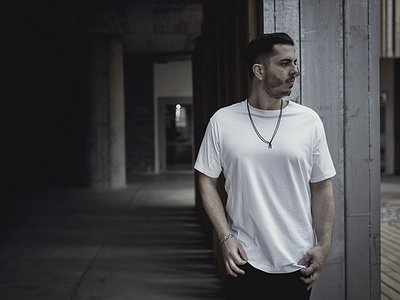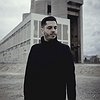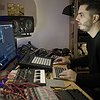Part 2
How do you make use of technology? In terms of the feedback mechanism between technology and creativity, what do humans excel at, what do machines excel at?
I suppose my whole work is based on technology. I barely use my acoustic guitar in any of it, so let’s say most of what I use to create relies on technology of some sort. Apart from that, most mediums I get information from are available via computers or personal devices, most interactions I have are via technology, apart from my social ones, which I try not to leave up to technology too much.
Humans excel at making technology a bigger part of their lives, and technology excels at everything it is designed for, most of the time. I think it’s really inspiring to make use of different kinds of technology to create, like I mentioned earlier, I find it essential to be completely free from any methods, and let things work for you, instead of working toward things.
Production tools, from instruments to complex software environments, contribute to the compositional process. How does this manifest itself in your work? Can you describe the co-authorship between yourself and your tools?
I like to abuse all of the tools I have access to. It’s always been like that, and it’s a major part of how I keep up my inspiration levels. Being a musician allows me to come up with full arrangements and melodies in my head before sitting down to record any ideas, but I also take advantage of my sound design expeditions to get me new ideas that wouldn’t normally originate from musical elements. Sometimes I’ll be trying some weird patching on my modular system which leads to nothing for hours, but then one eventual “blip” that sounds just right might blossom into the idea of a full track. It’s a very dynamic process, and in my case it changes on a per project basis.
I love using challenging software that inspires tweaking, but unfortunately most don’t, and I feel a little overwhelmed instead. With hardware instruments, especially the ones I own, no matter how deep they are, there’s always some bigger care involved in developing the interface, and that’s almost as important as the sound that comes out of it. When I don’t find what I’m looking for in the hardware domain, I go through different software options and often it does the trick.
Collaborations can take on many forms. What role do they play in your approach and what are your preferred ways of engaging with other creatives through, for example, file sharing, jamming or just talking about ideas?
I’ve done many collaborations over the course of my career, in every format imaginable. My first experiences were still very much in the band realm, even if working with electronic music, through the live p.a. format. I’ve learnt a lot from collaborating with other artists and from working as an engineer, taking inspiration from different work flows, mindsets and influences. I think my preferred way of doing it is jamming live. I’ve had very few experiences like that, but they’ve been incredibly rewarding, creatively speaking, even though none of the live jams I did with other people have ever been released or even properly finalised.
The process itself is magical, it’s pure connection at the most fundamental level, communication in its plenitude. But what I really find essential is to have some sort of feasible social interaction with whomever you’re working with, it makes a world of a difference. Getting the vibe is extremely important, it sets the mood and dictates the tone for the collaboration, it tells you ahead of everything else if it’s gonna work or not. Most of my negative experiences happened from the collaborations that didn’t involve any sort of direct interactions between me and the others involved.
Could you take us through a day in your life, from a possible morning routine through to your work? Do you have a fixed schedule? How do music and other aspects of your life feed back into each other - do you separate them or instead try to make them blend seamlessly?
I think my work could never be completely separated from my life. Being an artist is a full-time thing. It’s not really a job, it’s a calling. We’re antennas, and we’re always on, at least I am. Life itself is the main source of inspiration; it’s every artist’s muse, even if they don’t know it. I don’t have a fixed routine, it just never happens. The only certain thing in my day is that I wake up, thankfully.
Recently I’ve moved to a new place, and I have a terrace where I can go and read for a while, so I’ve been trying to do that over a cup of coffee in the morning, or whatever time I wake up. While I’m at it, the bell of a church, the doppler effect of the sound of a passing truck, or the wind blowing through a chimney nearby might give me an idea for a track, which makes me rush back to my home studio and start working on something. I don’t try to do it, but music and day to day life do blend seamlessly.
Could you describe your creative process on the basis of a piece or album that's particularly dear to you, please? Where did the ideas come from, how were they transformed in your mind, what did you start with and how do you refine these beginnings into the finished work of art?
I think it’s only possible to be precise if I’d be describing something recent, so I’d go with my collab with DJ Deeon [titled ‘We Have Bass’ that was released in March on Drumcode]. The whole thing started when a friend of mine posted a video documentary of his rave parties that he used to organise in the early/mid 2000s, called Circuito. I’d been a regular at most of those parties, and to this day I have a hard time finding a similar vibe. Deeon’s music was everywhere back then. Suddenly I felt that I needed to bring that vibe back, that I could do something about it.
I went to the studio and started working on a groove, as fat as possible. I had no idea if he would be up for the collab or not, but I wanted to make it as interesting as possible, with as little elements as possible initially, so that he’d agree to it. Luckily he did, and we also ended up being in São Paulo at the exact same time, so I booked a studio and asked him to do it in person - as I mentioned earlier, getting the vibe is key. After recording his vocals, I got back to my studio and started to play around with the different takes, we had a lot! When I came across the “we have bass” part, I knew I had it. It wasn’t clear during the recording session, but hearing it in context with the rest of the elements showed me that it was all I needed.
From that point onwards, it was just about making the arrangement work with little elements, staying true to Deeon’s famously minimal approach, but without losing my essence and aesthetics. It took a few plays from myself and Adam Beyer, and some feedback from him as well, to refine it to the version that was released on Drumcode.
There are many descriptions of the ideal state of mind for being creative. What is it like for you? What supports this ideal state of mind and what are distractions? Are there strategies to enter into this state more easily?
Being creative isn’t a static affair. I don’t think there is such a thing as an ideal state of mind for being creative, I’ve been through situations where I was angry, or depressed, and my creativity was exploding. I’ve been through moments of extreme bliss, and again, creativity was all over the place. But I’ve also had times in both situations where nothing happened, creatively speaking. I call these dry-spell, or drought, and they eventually wear out. I think it’s important to know your limitations and have the clarity to understand what is going on, instead of actively trying to do something about it, and being creative all of the time.
In my case, meditation, physical activities, listening to music, visiting an art gallery, reading a book, all these things build up my creative instinct, so when I know that I need time off, that the drought has kicked in, I’ll try to focus on these activities until something starts to happen again.








